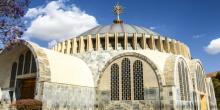The late Ali Mazrui speaks in this article to major political issues relevant to Ethiopia today, as the country undergoes a peaceful revolution. In his own words, he speaks through my adaptation of his various writings, speeches, and lectures on constitutionalism in Africa. The reader should also take pleasure in Mazrui’s witticism, in the ease with which he clarifies complicated concepts, and in his neologism (electoral polygamy)—qualities for which he had earned worldwide recognition. In...read more
The late Ali Mazrui speaks in this article to major political issues relevant to Ethiopia today, as the country undergoes a peaceful revolution. In his own words, he speaks through my adaptation of his various writings, speeches, and lectures on constitutionalism in Africa. The reader should also take pleasure in Mazrui’s witticism, in the ease with which he clarifies complicated concepts, and in his neologism (electoral polygamy)—qualities for which he had earned worldwide recognition. In the article, Mazrui’s ideas have been Ethiopianised where necessary.










































